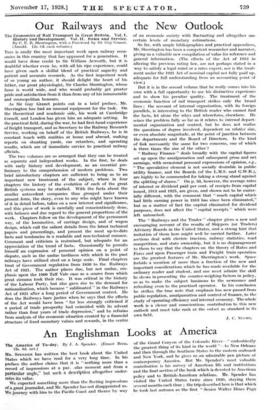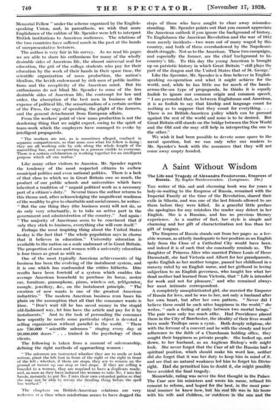An Englishman Looks at America
The America of To-day. By J. A. Spender. (Ernest Berm 12s. 6d. net.)
MR. SPENDER has written the best book about the United States which we have 'read for a very long time. In his preface the author claims that it is " nothing more than a record of impressions at a pais .,ular moment and from a particular angle," but such a description altogether under- rates its value.
We expected something more than the fleeting impressions of a great journalist, and Mr. Spender has not disappointed us. We journey with him to the Pacific Coast and thence by way
of the Grand Canyon of the Colorado River—" undoubtedly the greatest thing of its kind in the world "—to New Orleans and then through the Southern States to the eastern seaboard and New York, and he gives us an admirable pen picture of contemporary America. But Mr. Spender's most valuable contribution is his survey of American life and institutions and the final section of the book which is devoted to American policy and to British-American relations. Mr. Spender has visited the United States twice since 1920, staying there several months each time ; the trip described here is that which he took last autumn as the first " Senior Walter Hines Page
Memorial Fellow " under the scheme organized by the English- speaking Union, and, in parenthesis, we wish that more Englishmen of the calibre of Mr. Spender were left to interpret British institutions to American audiences. The relations of the two countries have suffered much in the past at the hands of unrepresentative lecturers.
The author is very fair in his survey. As we read his pages we are able to share his enthusiasm for many of the wholly desirable sides of American life, the almost universal zeal for education, the grit of the college students who pay for their education by the work of their hands in their spare time, the scientific organization of mass production, the nation's idealism, the lavish endowment by rich men of public institu- tions and the receptivity of the American mind. But his enthusiasms do not blind Mr. Spender to some of the less desirable sides of American life, the contempt for law and order, the absorption of the best men in business at the expense of political life, the sensationalism of a certain section of the Press, the orgy of spending, the plight of the farmers, and the general detachment from European affairs.
From the workers' point of view mass production is not the deadening thing that we might expect, owing to the spirit of team-work which the employers have managed to evoke by intelligent propaganda.
" The workers are not, as is sometimes alleged, confined in separate compartments, so that none sees what his fellow is doing they are all working side by side along the whole length of the assembling line, and co-operating in a process visible to everyone. There is a certain exhilaration in working together for an intelligent purpose which all can realize."
Like many other visitors to America, Mr. Spender regrets the tendency of the most respected citizens to eschew municipal politics and even national politics. There is a lack of that class to which we in Great Britain owe so much, the product of our public schools and universities which have inherited a tradition of " unpaid political work as a necessary part of a citizen's duty." Several times the author returns to this theme and, after acknowledging the magnificent readiness of the wealthy to give to charitable and social causes, he writes: " But the one thing they (the business men) will not do, or do only very reluctantly, is to take an active part in the government and administration of the country." And again : " The majority of Americans seem to be convinced that if only they stick to business, everything else will cure itself."
Perhaps the most inspiring thing about the United States to-day is the fact that " the whole population says in chorus that it believes in education." University education is available to the nation on a scale undreamt of in Great Britain. The proportion of men and women with a university education is four times as great as with us.
One of the most typically American achievements of big business has been the evolving of the instalment system, and it is one which has confounded the critics hitherto. Dire results have been foretold of a system which enables the average American household to purchase its horse, motor car, furniture, gramophone, piano, wireless set, reftlgerator, mangle, jewellery, &c., on the instalment principle. " The creation of new wants is one of the greatest American industries." The modern American business man bases his plans on the assumption that all that the consumer wants is time. " Don't wait till he has saved money in the stupid Old-fashioned way, let him have the article and pay for it by instalments." And to the task of persuading the consumer how urgently he needs some particular object is devoted a selling organization without parallel in the world. " There are 750,000 " scientific salesmen " ringing every day at 20,000,000 doors " . . . trained in the psychology of their clients.
The following is taken from a manual of salesmanship, defining the right methods of approaching women :
" The salesmen are instructed whether they are to smile or look serious. plant the left foot in front of the right or the right in front of the left ; whether, if there are steps, they are to remain on the ground or mount up one step or two steps. If they are selling a bracelet to a woman, they are required to have a duplicate ready, and, as soon as they have induced the woman to take No. 1 into her hands,..instant)y to Rut No. 2 into their own extended calms so that she may-not be able to. return the dazzling thing betore' the spell has 'worked.'" -
The chapters on British-American relations are very welcome at a time when misfortune seems to have dogged the steps of those who have sought to clear away misunder- standing. Mr. Spender points out that you cannot appreciate the American outlook if you ignore the background of history. To Englishmen the American Revolution and the war of 1812 were merely •incidents—two wars out of many waged by this country, and both of them overshadowed by the Napoleonic death struggle. Not so to the American. These two campaigns, and especially the former, are the chief background to his country's life. To this day the young American is brought up on patriotic history in which Great Britain " still plays the part of the dragon and the United States that of St. George."
Like the Spectator, Mr. Spender is a firm believer in English- speaking co-operation and what it might achieve for the world, and, while he has little use for much of the hands- across-the-sea type of propaganda, he thinks it is equally foolish to ignore our common origin and common speech. " I am persuaded that, as between Englishman and American, it is as foolish to say that kinship and language count for nothing as to suppose that they count for everything. . . . There is no British-American policy which can be pursued against the rest of the world and none is to be desired. But Great Britain still stands on the bridge between the New World and the Old and she may still help in interpreting the one to the other."
We wish it had been possible to devote some space to the naval question, but we can only refer our readers to Mr. Spender's book with the assurance that they will not come away empty handed.







































 Previous page
Previous page